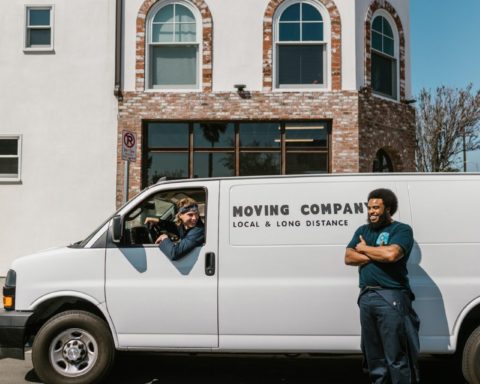The COVID-19 pandemic has made many of us stand still and take stock of our lives. For many, this has been the catalyst for making those big life decisions that otherwise we would never have considered, let alone followed through on. With the pandemic affecting us all in different ways, life has certainly become anything but predictable. So when faced with an opportunity to relocate, even though it may be a positive prospect, the choice can be an overwhelming one.
Our lives are the sum total of choices, made either by ourselves or others. There are small ones – like what to wear to work. Then there are bigger ones – like should I pack up my life and move across country? (Or world, for that matter). If the thought of relocating has crossed your mind, it’s possible questions of ‘where’, ‘when’, ‘where’ and ‘how’ are abound. To steer you through the decision-making process, here are a few points when considering relocating.
YOUR MENTAL HEALTH

The World Health Organisation defines mental health as “the foundation of well-being and effective functioning of individuals… it is the ability to think, learn and understand one’s emotions and the reactions of others.”
Simply put, if we are to make clear and thoughtful decisions, we need to be functioning at our optimal level.
If your ability to make a decision is impaired by feelings of anxiety, this could hamper you from the outset. It may cause you to delay your initial planning or stop you from making any kind of commitment at all. Fear of the unknown may lead to hasty decisions, which can have its own set of complications.
You can fortify your mental health in the following ways to ensure that you’re in the right ‘headspace’ when making your decision.
1. Do some physical activity:
A healthy mind means a healthy body, what affects you mentally has a direct effect on your physical body as well. Physical exercise or just doing daily walks can help you get perspective on things.
2. Speak to people you trust:
Some fears can only be allayed when talking with your family, employer or even a life coach. Speak to other people who have relocated to hear about their positive and negative experiences. After all, it may only be with the help of others that some of the more critical decisions can be made. Getting an outsider’s perspective may be just what you need to jump-start your decision-making. There is no shame in seeking out someone who can just listen without giving their opinion first. Sometimes we don’t need solutions, just a sounding board.
3. Accept the fact that you cannot control everything:
Consider the other side of the coin, and that is that not all eventualities will and can be accounted for and there will be aspects out of your control. The art of letting go is liberating. Knowing that there will be grey areas and being okay with dealing with it at that point is good.
WORK OPPORTUNITIES

The job market has never been more volatile. However, this is still the number one reason people are moving to new provinces and other countries.
So, you have decided to look for work opportunities in other provinces or even other countries. In some cases you have been given an opportunity you cannot refuse.
Remember research is key to getting you prepared for your big move. Businesstech does an article each year rating the top companies to work for in South Africa.
Doing a quick Google search on the province, its top sectors, with top employers, can yield fruitful results. Recruiters should always be our first stop when trying to read the job market in your new province. But when you are in a niche sector you may want to tap into your network of professionals, they often have inside info on some of the opportunities within your area of expertise.
It can be difficult trying to discern one company from the next when your are changing industries.
And it can be challenging starting over. The tried and tested, or shall I say, going ‘old school’, has never failed. A sure-fire way of getting hired is to reach out directly to the CEO’s, MD’s and managers of your targeted industry. Life has been made easier by using online professional platforms such as LinkedIn, to introduce yourself and showcasing your unique skills to get you noticed
In our world of connectivity, there are many options. Ultimately you only have one reputation, and one opportunity at a first impression. The key here is, to know what you offer and get organised. Putting together your portfolio of work, lining up your references with recommendation letters. All of which hold value in the world of business.
WHERE TO LIVE

So now that you are clear about why you are moving, and you have done the necessary research, there are a few practical decisions to make. The biggest one (after where you will work) is where you will be living.
Should you buy or rent? Should you sell your current home or turn it into a rental property?
There are many options and despite the pandemic, the property market in South Africa is alive and kicking.
According to bond originators Ooba, the property market is expected to show more growth and has already exceeded the initial expectations. Smaller towns have become business hubs because of the amount of people emigrating. Interest rates are still at a record low following interest rate cuts in 2020.
When trying to decide, think about how permanent you want your move to be.
This will help guide you on, whether you want to sell or rent. The biggest influencing factor will be, how much time will you spend back in your home province?
I would, however, add a few more extras to this point on the checklist. Find out where the best places are to stay by speaking to the locals, those who have been living in the area for three years or more. Consider the distance between your house and your place of work. Not to mention, if your commute to work is plagued by heavy traffic. Speak to possible future co-workers. This is also a good segue into building new friendships.
There are options for those who don’t like dealing with the administration of a big move.
You can simply hire a company to help you move. They will find you a place to stay, help you move from your old place to your new place and find storage and cleaning companies for you. They will even go as far as packing all your belongings in their desired place.
SCHOOLS AND EDUCATIONAL FACILITIES

This is potentially one of the hardest parts of moving with your family. When your kids are still of school-going age, finding a good school and a nurturing environment can be the most stressful part of the move.
Considering your child’s age, and if the town is small, it means options are limited. Saying goodbye can be hard when your child is in a good school with a good curriculum. In addition to managing your own mental health, you have to consider your child’s mental health.
You have the responsibility to minimise the impact the move has on your child’s mental health.
After all, they are losing everything that is familiar to them – their friends, much-loved teachers and in many cases the only home they have known.
Knowing which school is the best for your child may not be apparent. What do you do when you cannot find or match the level of education in your new province? This can lead to an impasse. There is no easy way of navigating through this decision when your work has given you a promotion or you are starting with a new company.
Seek out professionals with whom you can speak to.
They would be best placed to help you and your family. Speaking to the Education Department within the province, and get a feel for the various schools in your chosen area. Once you have identified a few options, speak to the respective heads of those schools. Go on the obligatory school tours, take your child along with you if possible. This is a great barometer for both you and your child.
Approach, if you can, the parent body or locals in the area. Find out where everyone else is sending their kids. Evaluate which sector, whether it be government, private or home-schooling, offers the best education and what you can afford. More and more parents are choosing homeschooling as an option. For those parents with younger children, it becomes tricky when both parents work. The key areas to consider once again is your child, your expectations, the schooling mode and your financial status.
HEALTHCARE SERVICES

When we are healthy we very seldom, if ever, consider our health. It usually only occurs to us when something goes wrong that we start to think of medical staff and ambulances. So put this on your list of priorities when relocating.
When you live in a city like Cape Town, for example, there are so many service providers, hospitals and private institutions to choose from. You can easily forget that the rest of South Africa may look a little different from yours.
Knowing the type of hospital you are looking for (private or public) will, of course, also depend on whether you are part of a medical aid scheme or not. Therefore if you are with a medical aid scheme, start with informing your service provider that you will be relocating. They will provide you with the list of network doctors in your new town – this information can also be found on your medical aid schemes website. If you are not part of a medical aid scheme but are still looking for the best medical service, the health department in your new province is your next stop. Find out which clinic in your area offers wide-ranging services.
When you do choose to move to a smaller town, the locals become your greatest resource. Everyone will know who the best doctor, nurse and pharmacists are. Often the most you need is a pharmacy and a family doctor. And for these most towns do have a Clicks or Dis-chem. Another good resource are your parent groups, they often have doctors’ names on hand if you need a GP, Dentist and ENT specialist for those unforeseen circumstances
SAFETY AND SECURITY

According to Wikipedia, South Africa has over 60 million people; it is the world’s 23rd-most populous nation and covers an area of 1,221,037 square kilometres. And according to the 2019 Global Peace Index by the Institute for Economics and Peace (IEP) shows that South Africa continues to slide down the rankings, as one of the most violent places to live.
But let’s face it, no matter where you travel to on this planet, safety and security is always a concern. So let us not be too alarmed by these statistics. We do have to consider it when figuring out where to stay.
You can choose to kit your house out with a state of the art alarm system which can come with or without armed response. You can set up your very own closed-circuit television system (CCTV). Together with the array of fence and boundary wall options. Many South Africans simply choose Estate living for peace of mind.
If all else fails, choose to have fur babies – they are often the early warning system for intruders. Whatever option you choose, there are always costs attached to it. So be sure to consider where you will be staying, which security companies operate in the area and what you want to spend. A simple Google search will give you a list of security options.
LEISURE OPPORTUNITIES

Did you know that there is a life beyond your work? Tongue in cheek, but a valid point to consider. Downtime and quality time with friends and family are paramount to our well-being. When having children, leisure activities are an essential part of their staple diet.
Once again, a Google search for things to do in your area will be a great start. Of course, there are all sorts of other resources. The likes of Facebook offers a plethora of groups that post daily. Alternatively, you can visit your local tour companies or sporting clubs.
Reaching out to companies and locals alike cannot be overstated, they will know the best places to eat, play, run or even just to relax. Depending on your interest, joining a local club will open up more opportunities. Often we learn and explore best when we are doing something new.
MAINTAINING FAMILY BONDS AND FRIENDSHIPS

Moving to a new environment is scary enough, not having family or friends in your immediate surroundings can be even scarier. For most of us, our family and friends are our strength and they inform the choices we make. Therefore staying connected to your family and friends once you have taken the plunge is crucial to keeping yourself fortified.
You will need to have a plan in place to make moving away from your loved ones a little bearable.
Consider some of the following options (other than telephone and SMS):
1. The words social media and mental health are not easy bedfellows, but in cases of separation they can help keep your relationships healthy. Making it a great alternative when you cannot spend physical time together. Have virtual family dinners; share special moments by taking pictures; create short video clips. Though nothing is quite like spending physical time together, a short ‘good morning’ and ‘goodnight’ voice note never hurt anybody. These activities keep the vitality in our relationships and make us appreciate those close to us.
2. Plan short visits with family ahead of time, if possible. This can really recharge those batteries and give you something to look forward to.
While family can never be replaced, part of the relocation process is a willingness to integrate into your new environment. So finding a religious group, parent group, leisure club or a professional network to surround yourself with is just what you may need to distract yourself. This helps you feel less lonely and leaves you with a bigger friendship circle.
***
This list has not been exhausted and there are many more elements that could be added. Hopefully, the points we’ve provided will get you on the right track. Know that no decision is permanent – changing your mind is always an option. One thing you would need to do, though, is to accept the outcomes of your decision and how it impacts your family – and to take it from there.
Disclaimer: The content of this post is not to be taken as healthcare advice. Neither Seasoned Journeys nor Gerzell Mathey are medical professionals. This is an anecdotal post only.





